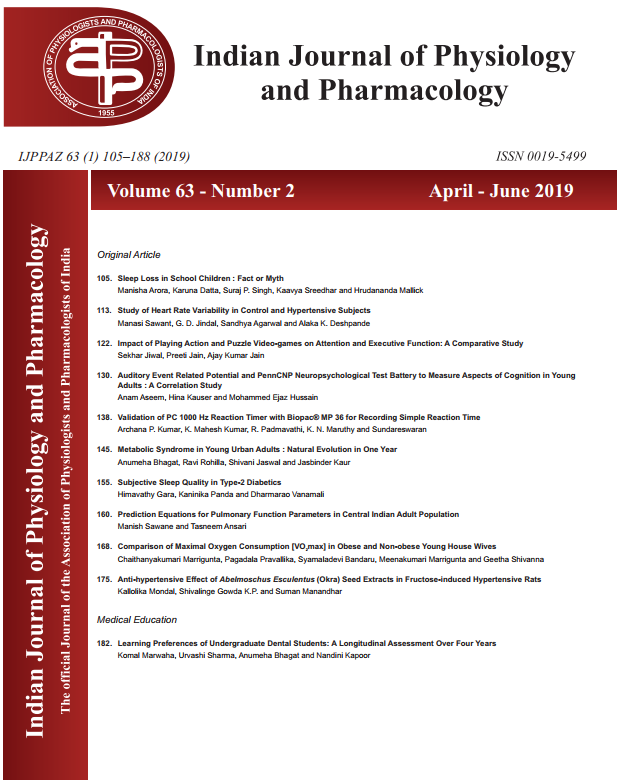This observational cross-sectional study was
conducted in the outpatient department (OPD) of
General Medicine, GVP IHC & MT, Vishakhapatnam
from January 2018 to April 2018. The study protocol
was approved by the Institutional Ethical Committee.
After explaining the nature of the study to subjects,
informed written consent was obtained. Participation
was voluntary, assuring confidentiality.
Confirmation of diagnosis of DM in the subject was
done as per American Diabetic Association
Guidelines (3). Exclusion criteria included age <18
years, type-I DM, pregnancy or lactation, any
psychiatric disorder or use of any psychotropic drugs,
diagnosed case of sleep disorder, other endocrine
disorders like thyroid disorders or on hormone therapy
like glucocorticoids medications, severe cognitive
impairment and refusal to participate.
Demographics features, characteristics of DM, co-morbid conditions, anthropometric measurements,
Pittsburgh Sleep Quality Index (PSQI) were obtained
by face-to face interview. The demographic
information included age, gender, education, marital
status, addiction, diet, physical activity. Based on
history taking, physician’s records and clinical
examination, details of DM and co-morbidities were
obtained. The glycemic control was assessed by
HbA1c measurement. HbA1c > 6.5% indicated poor
glycemic control (3).
Pittsburgh Sleep Quality Index4
It assessed subjective responses on sleep over past
4 weeks. It consisted of 19 items grouped into 7
sub-components: C1) Subjective Sleep Quality; C2)
Sleep Latency; C3) Sleep Duration; C4) Habitual
Sleep Efficiency; C5) Sleep Disturbances; C6) Use
of Sleeping Medication; and C7) Daytime
Dysfunction. Each subcomponent was scored on a
4-point Likert scale (0, 1, 2, and 3). The total of 7
scores yielded a global score in a range of ‘0’–‘21’
points. A higher global score was suggestive of worse
sleep quality. Score >5 was considered as poor
quality of sleep.
Score >5 has diagnostic sensitivity of 89.6% and
specificity of 86.5% in differentiating poor sleepers
from good sleepers. PSQI has high reliability and
validity with good internal consistency (Cronbach’s-D of 0.70-0.83).
The PSQI Global score was set as dependent
variable. The independent variables constituted
gender, age, Body Mass Index (BMI), physical
inactivity, duration of DM, HbA1c and presence of
co-morbid conditions. They were dichotomized as:
gender (male vs. female); age (d50 years vs. >50
years); BMI (<23 kg/m2 vs. t23 kg/m2); duration of
DM (d5 years vs. >5 years); HbA1c (d6.5% vs. >6.5%); physical inactivity and co-morbid conditions
(present vs. absent)
The data was analyzed using Statistical Package
for Social Sciences (SPSS) version-22. Quantitative
variables were expressed as Mean and Standard
Deviation (SD). Categorical variables were computed
as frequency (n) and percentage (%) and were
analyzed by Chi-square test. Multivariate Logistic
Regression analysis was used to evaluate
independent variables. Statistical significance was
set at p-value <0.05.


